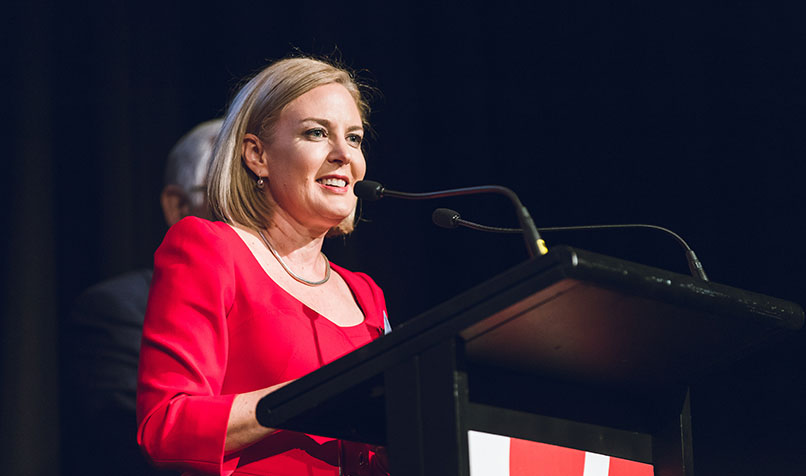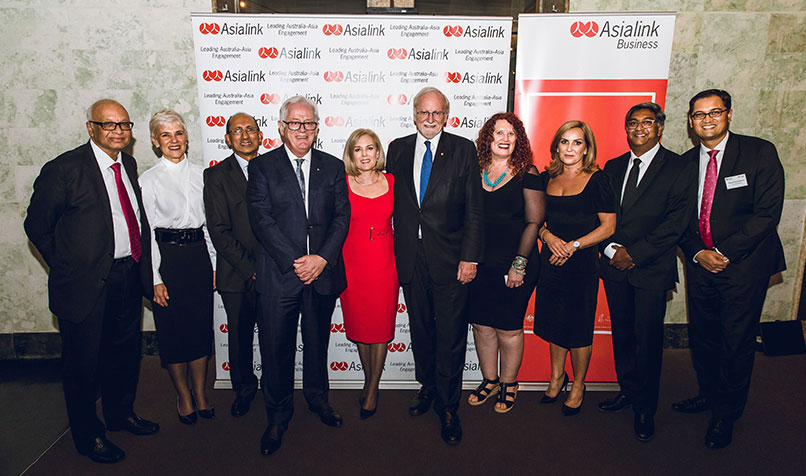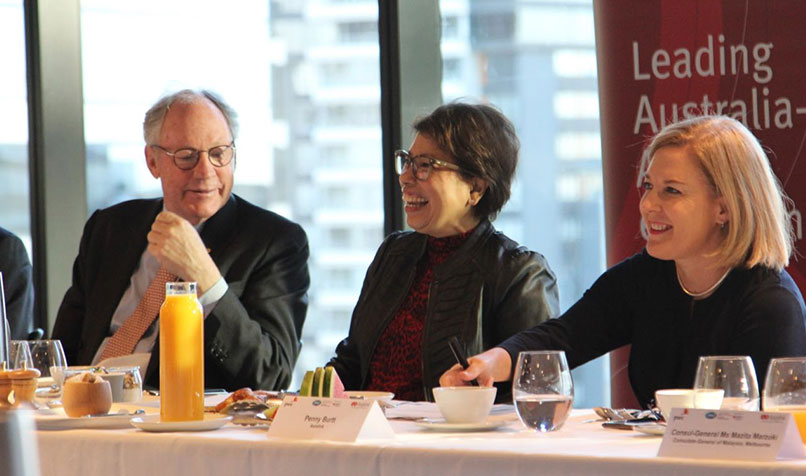Loading component...
At a glance
- Penny Burtt is CEO of Asialink, an organisation that promotes understanding of Asian countries and Australia’s role in the Asia-Pacific.
- Burtt started her career with the Department of Foreign Affairs and Trade, and served as deputy high commissioner for four years, advising former foreign minister Alexander Downer.
- She was involved in the Bougainville peace process, the Kyoto Protocol climate change negotiations, and in the creation and iteration of Australia’s policy on Myanmar.
- Burtt’s focus now is on building greater Australian engagement with Asia.
Nearly three decades ago, former prime minister Paul Keating spoke fervently of Australia’s growing economic presence across Asia.
In a 1992 lecture to the Asia-Australia Institute in Sydney titled Australia and Asia: Knowing Who We Are, he noted that geopolitical reforms in Asia had opened the door for Australia to enhance its positions in bilateral trade and cross-border business investment.
Success in Asia, Keating concluded, depended on establishing “beyond doubt, that Asia is where our future sustainability lies, that we can and must go there, and that this course we are on is irreversible”.
Australia has gone there. Its economic status across Asia has flourished since 1992, with China, Japan, South Korea and India now ranking as its top four export destinations, collectively accounting for almost A$180 billion in exports in 2018.
Most of this trade is in bulk commodities such as iron ore, coal, liquefied natural gas and other minerals, and agricultural produce.
Of Australia’s top 15 two-way trading partners, 11 are in Asia. The US comes in third, followed by South Korea, India and then New Zealand.
Yet, as entrenched as Australia is in the Asian region, many would argue that it still has a long way to go in maximising the available opportunities, especially in terms of investment.
“In many ways, we’re still not as present and engaged in the Asia-Pacific as we could be,” Penny Burtt, CEO of Asialink, tells INTHEBLACK. “In general, I think we still have quite a long way to go to be a fully integrated member of the Asian region.”
Asialink, an affiliate of the University of Melbourne and an initiative of The Myer Foundation, is chaired by former Liberal Party trade minister Andrew Robb, and widely regarded as Australia’s leading centre for the promotion of public understanding of the countries of Asia and of Australia’s role in the region.
Burtt's Asian journey

Few Australians have Burtt’s level of hands-on knowledge and experience in the Asian region. Born in Malaysia, while her father was stationed as a Royal Australian Air Force officer at the Butterworth base in Penang, she spent most of her childhood on the road, moving from one military base to another.
“I grew up as a military brat,” Burtt says. “I basically went to nearly 12 schools in 12 years in different countries. I lived all over Australia, and in Canada, and went to school briefly in a number of other countries, so I had a very diverse upbringing.
“There were times when it was definitely challenging, but what it did was give me a great sense of adaptability and flexibility and people skills. I think I was so fortunate that my parents were incredibly supportive, that moving so often meant adapting very quickly to a new environment and creating networks and relationships consistently.”
Burtt’s educational and career path resulted from her background and social skill sets, along with her exposure to different cultures and languages.
“I got a lot of contact through my parents with embassies wherever we travelled, and it seemed to me like a really interesting life, to be able to serve your country and travel abroad.
"There were times when it was definitely challenging, but what it did was give me a great sense of adaptability and flexibility and people skills."
“It just seemed to me like a very natural step to want to go and work for the Department of Foreign Affairs and Trade [DFAT]. Basically, I decided to become a diplomat when I was about 14 years old, and everything I did from that point onwards academically and everything else was all directed at being accepted.”
Finishing secondary school in Canberra, Burtt went on to tertiary studies, completing a bachelor of economics with honours at the University of Sydney, followed by post graduate studies in foreign affairs and trade, international relations and national security at the Australian National University.
Joining DFAT as a graduate in 1990, she soon became immersed in the major Uruguay Round of multilateral trade negotiations underway at the time, conducted within the framework of the General Agreement on Tariffs and Trade. She went on from there to work on DFAT’s European Community desk, specifically on agricultural policy.
Burtt’s first offshore posting with the department was to Malaysia, marking the beginning of a long career in Asia that also included stations in Indonesia and Singapore, where she served as deputy high commissioner from 2006 to 2010, and as an adviser to former foreign minister Alexander Downer.
In this role she was involved in, among other things, the Bougainville peace process, the Kyoto Protocol climate change negotiations, and in the creation and iteration of Australia’s policy on Myanmar.
Career highs and lows

During her time with DFAT, Burtt was at the coalface of key trade negotiations that have shaped Australia’s position in Asia. She also worked closely with Australian businesses encountering difficulties in the region, such as market access problems.
“There were many high points. I enjoyed working in Singapore and seeing the whole formation in the early days of the very first strategic partnership between Australia and Singapore,” she says.
“One of the other things I really enjoyed was my time working as a ministerial adviser with the former foreign minister.”
However, low points, including a very lucky escape, were the Bali bombings in Indonesia in 2002 and 2005, and the bombing of the Australian embassy in Jakarta in September 2004.
“I was the last person through the gates,” Burtt reveals when recalling the Australian embassy bombing.
“I was extremely fortunate. I’d actually just made it back to my desk and had just opened my computer at my desk when the bomb went off.
“I think it was very interesting from that chapter, realising in Indonesia how incredible the relationship between Australia and Indonesia is, and seeing and experiencing being part of what was an amazing level of collaboration between the two governments in responding to the terrorism threat in the region.”
Burtt’s senior government roles, and her dealings with the business sector, made her transition to the private sector an obvious next step. In 2011, she joined global management consultants McKinsey & Company in Singapore as head of public affairs and external relations, South-East Asia, and as head of client service risk in Asia.
“The whole trick to being successful was really understanding how to unlock the value of my knowledge and experience in a new context, and the whole transition I have to say was incredibly humbling and really challenging, and really exciting.
“The firm is a fantastic environment for learning and there is a huge capacity for stepping into a range of different issues and getting involved.One of the areas I was extremely fortunate to have the opportunity to step up on was women, and women’s leadership and women’s empowerment in parliament.”
In 2015, Burtt moved to global financial services group Visa as vice president government relations, with a focus on building industry expertise in technology and digital. The role involved joining the company’s Asia-Pacific leadership team, adding to her senior leadership experience.
“I had always been very much focused on South-East Asia, so the job with Visa offered me the ability to really build some very deep sectoral expertise, to deepen my North Asia exposure, and a fantastic opportunity to join the C-suite of a major multinational in the Asia-Pacific.”
Asialink's vision

Burtt returned to Australia last year as Asialink CEO because of what she describes as the need to come back and use her Asian knowledge and experience in Australia, while refreshing her government and corporate networks.
“I think the Australia-Asia engagement has remained incredibly important to me, and the great unfinished national project,” she says.
Burtt’s vision is for Asialink to be Australia’s leading centre for Asia engagement, through delivering insight, capability building and connections.
“We do insight, so that’s creating knowledge and awareness and making sure that people know and understand what’s happening in the region. We work in capability building, whether that’s teaching negotiating skills to business people or working with school leaders on intercultural capability and linking them with their peers in the region.
“It’s sending Australian artists to live and work in the region on residencies and exchanges, or working with, in the diplomacy area, young people who are interested in planning international careers, exposing them to key issues in foreign policy.”
Asialink is helping to build business connections and networks between Australia and the region, which underpins the centre’s activities. “You know, sometimes it can be very hard for people who have spent a very long time away as expatriates to come back to Australia. Often it’s very hard to find jobs where people are interested in your Asia expertise and want to use it. Asialink’s a gift in that way because all of that knowledge and experience that I have is directly relevant to our mission.”
Since joining Asialink, Burtt has kept up a busy travel schedule around Australia and Asia. Travel goes with the territory, and she’s used to it. She has been to China, Singapore, Malaysia, and Hong Kong, all within a few months.
"I think the Australia-Asia engagement has remained incredibly important to me, and the great unfinished national project."
She continues to collaborate closely with DFAT to provide a platform for business engagement, and recently hosted the ASEAN Secretary General, Dato Paduka Lim Jock Hoi, for discussions with Australian business. In April 2019, Asialink also hosted the new Asia Pacific Economic Cooperation (APEC) executive director, Tan Sri Datuk Dr Rebecca Fatima Sta Maria, who visited from Singapore.
Burtt says the greatest opportunity Australia has is to develop a deeper Asia capability and understanding of the countries in the region.
“If you look at the education system, which we do through the Asia Education Foundation under Asialink, Asian language study in Australia has gone backwards in the last 30 years. It’s a small indicator, but it’s a really important indicator of our ability to be able to engage, and our interest levels.”
Burtt says Australia has made much progress over time, with a large diaspora community in Asia and substantial assets.
“But, if you just think about our trade numbers: while China is our largest trading partner and our top four trading partners are Asian, we still actually invest less in the whole of Asia than we do in the US. There’s a big challenge, but there are huge opportunities if Australia decides to engage differently.
“What I would really like to achieve in the next three to five years is working with others to really achieve a step change in our engagement. That is my overall objective.”
What books have you read that have given you insights into Asia?
“Some of the books I have read recently on Asia, which I would recommend, include Parag Khanna’s The Future is Asian, James Crabtree’s The Billionaire Raj – an eye-opening account of contemporary India, and Billion Dollar Whale by Tom Wright and Bradley Hope on the 1MDB scandal in Malaysia.
“While that is a lot of ‘billions’, the books are refreshing, accessible and insightful on the big issues in some of our neighbouring countries.”
Activities outside of work
“Women’s leadership is a high priority for me and I volunteer in the not-for-profit sector to teach leadership and coach and mentor other women.
“I will be in Malaysia to help deliver a leadership program for young women from across South-East Asia. I am also a frequent speaker on women’s leadership issues in the corporate sector. I am also passionate about social enterprise.”
Must-have skills
“Resilience, the ability to create and sustain networks and relationships, strategic thinking.”

